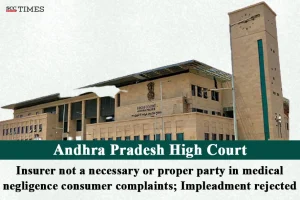Andhra Pradesh High Court : In a writ petition filed under Article 226 seeking to set aside or quash the order dated 07-03-2024 of the District Consumer Disputes Redressal Commission at Guntur and the order of the A.P. State Consumer Disputes Redressal Commission, Vijayawada with further direction to the District Forum to implead the 3rd respondent, a Division Bench of Ravi Nath Tilhari and Challa Gunaranjan, JJ. held that the insurance company is neither a necessary nor proper party claiming compensation for medical negligence against the petitioner.
The petitioner along with other doctors from Yashoda Hospitals, was arrayed as an opposite party before the District Consumer Disputes Redressal Commission, Guntur. The complainant had alleged medical negligence and deficiency in service during treatment provided at the hospital. During the pendency of the complaint, the petitioner filed miscellaneous application under Order I Rule 10 of the Code of Civil Procedure, 1908 (‘CPC’), seeking impleadment of New India Assurance Company Limited as Opposite Party 4. It was contended that since the hospital was insured under a professional indemnity policy issued by the said insurer, its presence was necessary for complete adjudication of the dispute and for avoiding multiplicity of proceedings.
The complainant opposed the application, asserting that there existed no privity of contract between him and the insurer. Accepting this objection, the District Commission, by order dated 07-03-2024, dismissed the impleadment application, holding that the complainant was neither a consumer nor a beneficiary under the insurance policy. The Commission further observed that if liability were to be fastened on the petitioner at the conclusion of the proceedings, he would be entitled to claim reimbursement from the insurer in accordance with the terms of the policy.
The petitioner’s revision was dismissed by the A.P. State Consumer Disputes Redressal Commission on 31-12-2024. A further revision before the National Consumer Disputes Redressal Commission was rejected as not maintainable on 06-03-2025, leading to the present writ petition before the High Court.
Counsel for the petitioner argued that the insurer was at least a proper party since its inclusion would prevent multiple proceedings and facilitate direct adjudication of indemnity liability. Reliance was placed on Amar Jain Hospital v. Devkinandan Soni, 2015 SCC Online NCDRC, where the National Commission had allowed impleadment of insurers in similar circumstances. It was further contended that the approach adopted under the Motor Vehicles Act, 1988, in accident claims where insurers are routinely impleaded should be analogically extended to consumer medical negligence cases.
The questions under consideration were:
(1) Whether the insurer, New India Assurance Company Limited, is a necessary or proper party to a consumer complaint alleging medical negligence; and
(2) Whether the District Commission’s refusal to implead the insurer warranted interference under Article 226.
The Court examined Order I Rule 10 CPC and reiterated the settled principles governing addition of parties. Referring to Sudhamayee Pattnaik v. Bibhu Prasad Sahoo, (2022) 17 SCC 286, and Mumbai International Airport (P) Ltd. v. Regency Convention Centre & Hotels (P) Ltd., (2010) 7 SCC 417, the Court emphasized that the plaintiff is dominus litis and cannot be compelled to sue any person unless that person’s presence is essential to enable the Court to pass an effective and complete decree. The Court further cited J.N. Real Estate v. Shailendra Pradhan, 2025 SCC OnLine SC 1015, reaffirming that while the court possesses discretion to add or strike out parties, such power must be exercised only when the person sought to be added is demonstrably a necessary or proper party.
The Court observed that the dispute before the Consumer Commission pertained to alleged negligence and deficiency in service by the doctors and hospital, which could be effectively adjudicated without the insurer’s participation. The complainant had no contractual or consumer relationship with the insurer, and the insurance policy in question merely governed the inter se indemnity between the hospital and the insurer. Such indemnity issues could be independently pursued by the insured party after the adjudication of liability; their resolution was not integral to the consumer complaint.
The Court expressly declined to follow the National Commission’s reasoning in Dr. C.C. Choubal (supra), which had treated the insurer as a proper party merely because any finding of negligence would trigger liability under the policy. The Court held that the test of necessity or propriety cannot be diluted merely for administrative convenience, and any expansion of party impleadment must be justified within the strict parameters of Order I Rule 10 CPC.
Addressing the petitioner’s analogy with motor accident claims, the Court noted that under the Motor Vehicles Act, 1988, third-party insurance is compulsory, and the insurer’s role is statutorily recognised under Sections 146, 149, and 168, read with Rule 476(5) of the A.P. Motor Vehicles Rules, 1989. The insurer is mandated to satisfy decrees and participate in proceedings owing to statutory liability, as explained by the Supreme Court in S. Iyyapan v. United India Insurance Co. Ltd., (2013) 7 SCC 62. No such statutory framework exists in the realm of medical negligence; hence, the analogy is misconceived.
Concluding that New India Assurance Co. Ltd. was neither a necessary nor a proper party to the consumer complaint, the Court held that the complainant, being dominus litis, could not be compelled to add the insurer against his will. The issues of negligence and deficiency in service could be effectively decided among the existing parties, and any indemnity claim by the hospital against its insurer must be pursued independently in appropriate proceedings.
Accordingly, the Court dismissed the writ petition, affirming the District and State Commissions’ orders.
[Dr. Mudunuri Ravi Kiran v DCDRC, 2025 SCC OnLine AP 3703, decided on 09-10-2025]
Advocates who appeared in this case:
Counsel for the Appellants: Sri K. Sarvabhouma Rao

